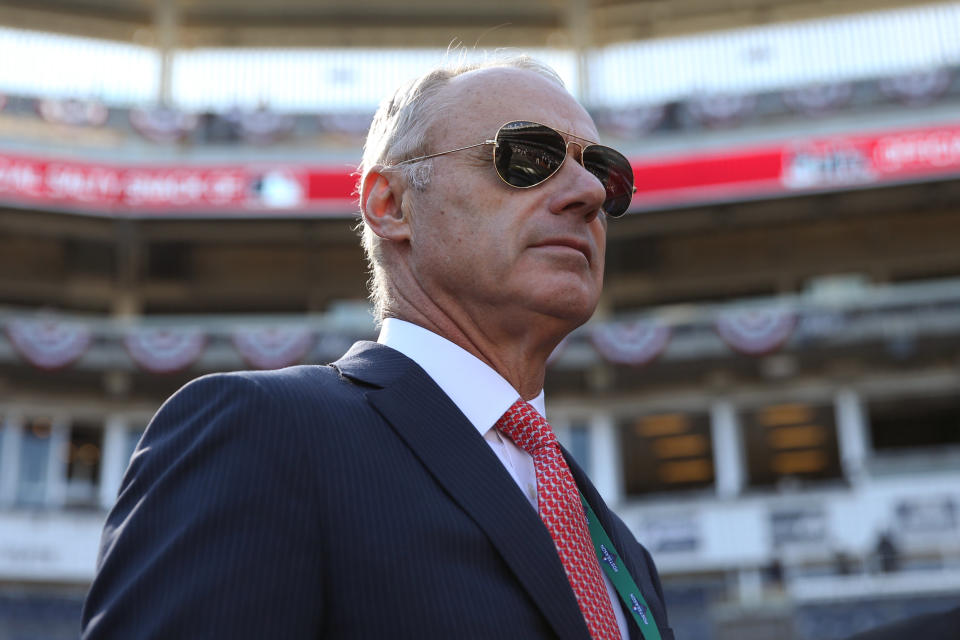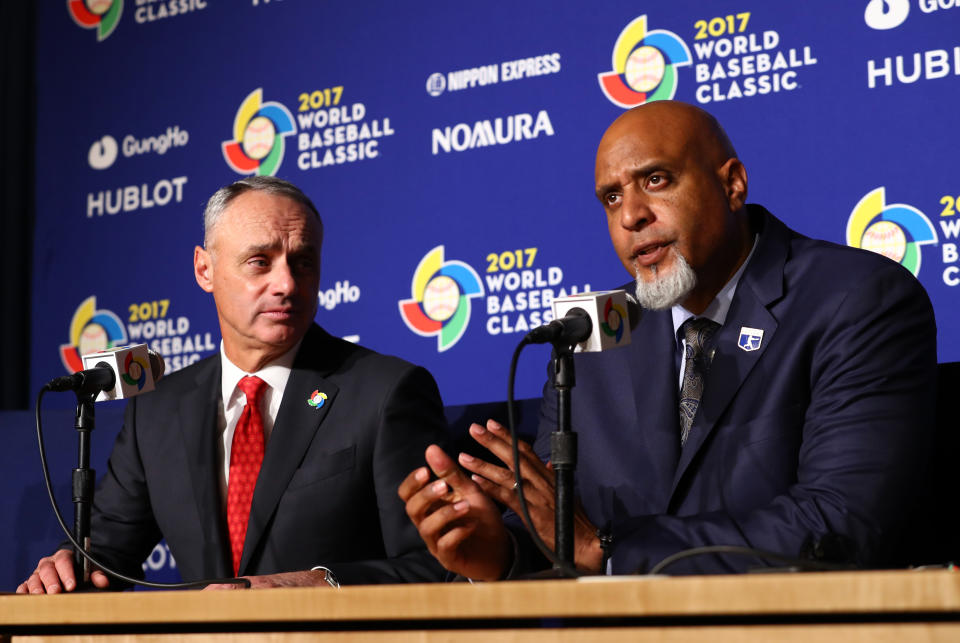Here's what Rob Manfred’s ominous comments mean in baseball's labor saga

ARLINGTON, Texas — Despite the understandable outrage at the sentiments contained therein, it is not all that surprising that commissioner Rob Manfred reportedly told the Major League Baseball Players Association that their forthcoming negotiation was “not going to be a deal where we pay you in economics to get labor peace.”
After all, admitting the opposite would likely not have gone over well with the 30 owners — with whom he met this week in Texas — who effectively serve as his bosses. Even so, saying as much didn’t quell the perception that a work stoppage might be looming when the current Collective Bargaining Agreement expires prior to the 2022 season. After several slow offseasons (although there the tide might actually be turning) the players have become increasingly outspoken about their frustrations and the feeling that drastic action might be required to win back a larger percentage of baseball’s overall revenue.
(It’s worth noting, as NBC Sports’ Craig Calcaterra did, that such a work stoppage would almost certainly be in the form of a lockout and not a strike — but getting to that point would still constitute a show of concerted and pointed strength on the part of the players.)
Manfred’s comments had occurred during one of the summer meetings of the on-going midterm talks with the union (which were launched specifically in an effort to ease some of the mounting labor tensions), but were made public on Wednesday — just in time for him to address members of the media Thursday.
He was primarily displeased that the comments had gotten out. “One of the things that I never do is talk about what is said in a bargaining room,” he said, before going on to do just that.
He called the reports an “unproductive mischaracterization of the comment” before providing his version of events. According to Manfred, in a meeting between himself, deputy commissioner Dan Halem, MLBPA’s executive director Tony Clark, and chief union negotiator Bruce Meyer, the union representatives suggested a series of changes to the CBA that “would give back to the union everything we’ve achieved over the last couple decades.”

“I asked in response to his suggestion, what was in that deal for the clubs,” Manfred told reporters. “And he said, ‘Labor peace.’ ”
Manfred said the real version of his response that had been misconstrued was: “Labor peace is a mutual benefit, it’s not something you trade economics against. It is a mutual benefit. It keeps the players working and getting paid and it keeps our business going forward.”
Whether this is meaningfully different than refusing economic concessions in exchange for labor peace is sort of beside the point, largely because that is just a public litigating of what will necessarily happen.
In the business battle of major league baseball that is — and is designed to be — a hard-won balance of power between the league and the MLBPA, the scales have quite evidently tipped in the league’s favor of late. Manfred himself admitted (which is perhaps not the right word since what else would he be trying to do?) as much in referencing an unwillingness to “give back” everything the league had achieved. Perhaps for that reason, the league might be willing to preserve the status quo in the next CBA — but the union is not.
Both because it is their obligation to their constituents and because baseball’s rising revenues have failed to reach the players, the union’s clear objective — which has been expressed to the league — is to make net gain on the economic front. While they have some on-field chips to barter, their main leverage is public perception, the good of the game, and a work stoppage.
It would be wrong to expect Rob Manfred to say either publicly or privately two years before the current CBA expires that the threat of a work stoppage would move him to make economic concessions. That’s not how any of this works.
But hopefully Manfred is not actually dismissing out of hand the possibility that the players are willing to risk a lockout in exchange for well-earned economic gains. Labor peace is only mutually beneficial if both sides are happy with the current ecosystem. Spinning it as some sort of gentleman's agreement and not the ultimate bargaining chip is disingenuous. The owners and the league know they've enjoyed the spoils of the game’s success lately; is it any wonder that the other side is willing to go to the mat for the same?
More from Yahoo Sports:

